List Mocks Your Maturity
Here are the 50 signs you are a grown-up. How many apply to you? (Feel free to ignore the super-Britishy ones.)
Scary-Looking Pig Really Scary-Looking Dog
“Chinese residents were left terrified after mistaking a pink-skinned stray dog for either an escaped genetically modified pig or a strangely coloured mini-horse.” Yes, there is a photo.
The Tiny Newspaper In North Carolina That Scooped Up Journalism's Big Prizes
The Tiny Newspaper In North Carolina That Scooped Up Journalism’s Big Prizes
by Dan Cooper
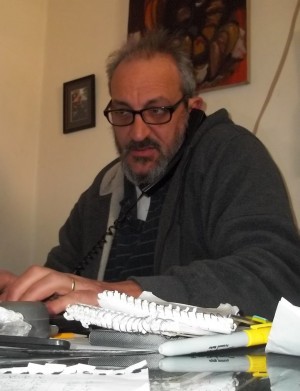
Yancey County is located in the mountainous western stretch of North Carolina, about 45 minutes from Asheville. The county’s population is less than 18,000, and yet it has two local papers to serve it: the Yancey Common Times Journal, which has been in publication more than a hundred years, and the “other” newspaper, the Yancey County News, founded in 2011. The paper’s masthead lists only two people — husband and wife Jonathan and Susan Austin — but nevertheless, its first year out, the Yancey County News has won two major journalism awards, the E.W. Scripps Award for Distinguished Service to the First Amendment and the Ancil Payne Award for Ethics in Journalism.
The prizes were both awarded for stories reporting on corruption in the county’s official channels. In one series, the paper revealed that the county’s deputy-sheriff had pawned county-owned firearms for personal gain; another series uncovered absentee ballot fraud, voter coercion, and voter anonymity rights violations in the county. Juries for both awards recognized not only the quality of the reporting, but the extraordinary efforts necessary to get such reporting done in a paper’s first year of existence.
The Yancey County News is a weekly, available online for free as well as in print for fifty cents. In addition to its prize-winning journalism, the paper also prints out the school’s weekly lunch menu. Its print circulation is 1,200. The other day I spoke to Jonathan by phone, and over the course of our conversation, he had some gems to offer about the history of journalism, his commitment to rigorous reporting, and what it’s like to operate in such a small community.
Your First Amendment award cited admiration for doing great work “despite risks both financial and physical.” You modestly claim only to be doing what any journalist learns in Journalism 101. How were you able to uncover corruption where others weren’t?
Part of it is that I haven’t been wedded to one job for fifty years. I’ve worked at the Montgomery Advertiser, CNN.com, Media General, Gannett. I’ve been a newsroom reporter, copy editor, news editor, city editor, all in a variety of Southern communities.
It’s gone now, but I’ll argue this as long as I live, there was a point where the New York Times was this fascinating and very valuable resource for their regional newspapers. A lot of people didn’t understand that the New York Times did have small dailies all over the South. When I first started with them in the early 80s, they had a skilled and highly knowledgeable manager to interact with those papers that were all over the U.S. The first was Seymour Topping; we would meet him on at least a yearly basis. But the one I miss so badly was a gentleman named John Lee. After being the business editor of the New York Times, he became the editorial advisor for the regional newspapers. He was a resource. I could pick up the phone, call him, and he would answer the phone and help me become a better manager.
I think it’s always more beneficial for a journalist to have thrown a wide net with their career and seen a wide variety of issues over 25-plus years as opposed to working at only one paper and with one job.
At one point, the New York Times went a route that meant abandoning the regional newspapers. You can’t predict the future, but I trace it to when they bought the Boston Globe. They were wanting to lock up the advertising corridor of the US Northeast. At the same time, they were working on buying the Boston Globe
they had the opportunity buy what had been the Multimedia Newsgroup, which was a wide-ranging capital city grouping but they let Gannett get that. Can you predict the future? No, but they rolled the dice buying the Globe for a billion, and I think they may not have had the great payoff they had hoped for. As a result, I think that the regional papers suffer.
I was sort of unique in the world of journalism. I was in the army reserve. There was training in that arena, which is tremendously valuable. When you go back to my formative years I can happily say that most of the editors had been veterans. In almost all circumstances, we learned, that we’re almost all not alike. There’s nothing quite as abrupt as going to basic training with 120 people from everywhere.
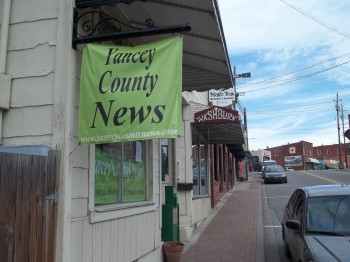
How did you come to start a news agency in Yancey County, only a couple hundred yards from the 100-plus-year-old Yancey Common Times Journal?
When my dad was in his low 90s and my stepmother died, he was starting, for the first time in his life, to deal with WWII PTSD. So my siblings and I decided that it would be best if someone could be with him and I was lucky enough to be able to live here with him and be the editor for a neighboring county’s weekly.
I started in newspapers in the early 80s. My father and stepmother lived here [Yancey County] and on my frequent visits here I felt no one was reporting on the community in a way that I thought that basic journalism 101 required… This week, for example, they’ve [The Yancey Common Times Journal] put out a piece on the county commissioners meeting on the first of the month but they’ve written nothing on what went on. I just don’t agree with the ‘pick and choose’ style of journalism. I come out of the school that says, if there is something going on, you try and write about it. Though I fail miserably in so many ways, because there is so little time I have, because I’m just one man, I try and touch on everything I can.”
In many ways, it’s just what you learn in journalism 101. It’s not investigative aggressive; it’s showing up aggressive. It’s covering as many of the items of what goes on in a community in any given week. We’re storytellers so when I’m talking to journalists, I try and remind them that we come up with scripts for the things we don’t necessarily want to tell our grandma and I remind them — Who, What, When, Where, and Why. That community I felt didn’t have anything aggressive enough..”
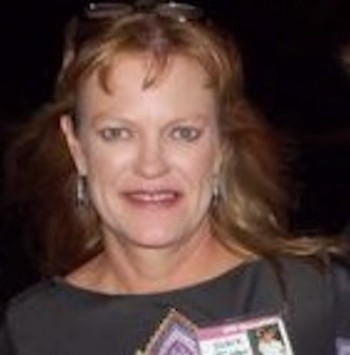
Where does your funding come from, and how do you imagine you will continue to fund and feed yourselves?
It’s not that expensive. I use my computer, my wife has a computer. I have a digital camera, so I’m set. No more pica poles or reduction wheels. It’s so easy now. My wife and I had a savings, some little inheritance; we don’t have a house payment, we don’t buy new cars, we live frugally, and, at this point, we have consistent advertising revenue.
One thing that E.W. Scripps said at one point in his career, is that it was the purpose and requirement of newspapers to anger their advertisers by reporting the truth and the facts and damn the outcome. There has been a war waged on us in this community by the people whose foibles or criminality we have exposed. Nonetheless, there is an open… or maybe just a part of the community that was hungry for what we’re doing here. The reason my first edition had a story about the state opening the criminal investigation into the 2010 general election because people here had reported criminal activity in the election and the gathering of votes… so we do have tremendous support here in a segment of the population that doesn’t have a dog in the fight.
What’s interesting is that I’ll be out and someone will slide up alongside me and, almost like a cartoon, they will whisper, “Hey, I really like what you’re doing.” and then they’ll slowly move away. Don’t be seen congratulating the other paper, don’t be seen congratulating Jonathan. But many do.
A state bureau of investigations agent told me that downtown merchants have been repeatedly told by law enforcement that if they advertise with me there will be repercussions. One retailer, selling fifty-plus papers a week, suddenly stopped, saying they “couldn’t keep up with the quarters.” But it turns out according to their staff, who came running out of the store to tell us, that, actually, they love the paper; some high-ranking person had told them that if they kept selling the paper they would lose the contract to feed all the prisoners in the jail. People will engage in war against you and there has been an economic war waged against us because we did expose the individuals who were expected to enforce the law, but who may in fact be the largest organized criminal group in the community, or they may even be controlling the crime.
You affect your community because you provide content that children read. We are in a unique situation here in Yancey because the older medias have chosen to avoid — to go out of their way to “not affect their community.” Why did they do that? That’s for them to say. I feel like they were a little too comfortable.
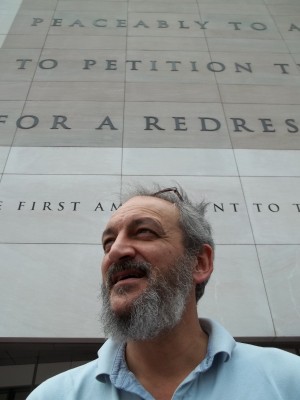
The E.W. Scripps award judges congratulated you for pushing your resources “to the limit, day after day” to produce excellent journalism. There are only two people on the masthead. How do you do this?
We are a two-person staff. We get some help from our son-in-law, to deliver [papers], but otherwise, we are a two-person newspaper. One thing that was really interesting to start a new newspaper was actually finding a press because the number of all newspaper press facilities are shrinking. Even Asheville, which has, like, a 50,000 daily, closed their press and consolidated at another Gannett press in Greenville. So we found a press about an hour and ten minutes away. So Mathew, the son-in-law, goes and picks it up from the press and brings it back and then helps me get them to the post office and then delivers it to all of our retailers Since we rented our Main Street facility, he gets to live rent free upstairs.
We’re now 70 editions through — 70 weeks done. I don’t care whether people… To me, it’s just another arena that in the long run will benefit my business. I don’t charge for obits; everyone else does, so I don’t and I don’t ever foresee charging for them. For me, I don’t have to meet a target budget for an owner somewhere out of state. We are the owner. So long as we are satisfied, and we feel like we can have some safety net, then I’m fine with that.
How do you see the relationship between local and national news agencies developing? Do you foresee yourself ever working with an organization like Patch.com?
Could I see me becoming a content provider for Patch or a bigger metro paper in an independent way? If they see value in it, I’ll talk with them. That might be one of the problems with the big metros: they have divorced themselves from the small communities that surround them that in many ways are a larger part of the economic base than their downtown area. Very few big papers are going to care about what goes on in our school board meetings unless it involves a dramatic upheaval.”
Why do you offer a print version of the Yancey County News?
Not many papers can start off and in a year build up to 1,200, on the fact that people come to realize that I am here for the long haul. I do try and cover all topics whether they like them or not. Even those who have a grudge about the fact that I’m exposing fault lines in the county tend to, in the end, plunk down their 50 cents and buy the paper.
You have to rely on almost 30 years of experience; that’s where the editorial process gets going, where the rubber hits the road. As Garrison Keillor would say, “that’s righteous time.” I try and subscribe to the theory that everything is important to someone. I doubt that anyone not in school bothers to read the lunch page but I bet they understand the purpose for it being there.
I also do a page of the agriculture auctions, not only the ones closest to us but those from Tennessee and Virginia. Since we’re so close why not check their prices? I love the concept of the farmer being able to get 27 cents more per pound of this or that if they go over to Auction A rather than B, instead of the auction that may seem the most obvious.
In our country, and I think across the nation, there’s a return to the value of agriculture. It’s one of the marks that can define the value of a community.
What kind of web traffic are you seeing?
We see 500 a week across the website. We refer to them as ‘expats’ — former residents, people whose parents live here or whose parents who have an intimacy with the community, but for whatever reason they’re living elsewhere.
What does it mean that you’ve won these awards?
I don’t know that I could ever accurately provide an answer to that but I think that based on my background, what it means for me is that I need at least to reach out to the universities — Appalachian State University, to the north; East Tennessee State University, which is to the northwest; UNC-Asheville, which is to the south — and say, “in case you didn’t know it, we did this! And if you want to pursue any sort of conversation that might have an impact on your teaching of journalism and to change what your students see as high-quality journalism, I’m here…” Am I going to be a teacher? No. Am I available to have my brain picked? Sure.
I’m extremely proud of the stories we’ve covered. But that’s not all we are. The hardest thing now is to convince people that we’re not just muckrakers… The prom is this weekend and I’m very excited about that. It’s modeled on the Golden Globes, “here comes Jimmy and Jane!” They have big sky spotlights and a red carpet. It’s a big deal. To me, doing that well in any given week is just as important as getting the big investigative story.
Related: A Q&A; With A ‘Daily News’ Crime Reporter
Dan Cooper contributes to a handful of projects. Some involve writing and others do not. Photos by Susan Austin, used with permission.
Robin Thicke, "Exhale (Shoop Shoop)"
I guess I need to get over this thing where I hear the theme song from “Growing Pains” every time I see Robin Thicke. Because he’s totally turning into his generation’s Michael McDonald. To some people that may sound like a bad thing. But it is really a good thing. Above, Thicke pays tribute to Whitney Houston with a beautiful cover version of her “Exhale (Shoop Shoop)”.
Tick Tock
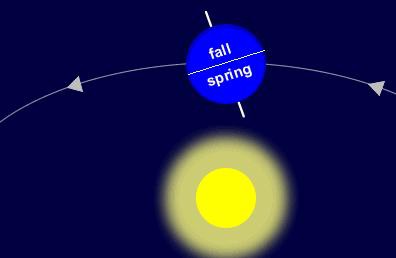
“There is an immense opportunity — maybe it’s even a business opportunity — to look at our temporal world and think about calendars and clocks and human behavior, to think about each interaction as a specific unit, to take careful note of how we parcel out moments. Whether a mouse moving across a screen or the progress of a Facebook post through a thousand different servers, the way we value time seems to have altered, as if the earth tilted on its axis, as if the seasons are different and new.”
— In case you haven’t read this a thousand times yet.
Science Fight!
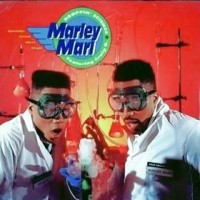
“It’s the same feeling I get whenever someone uses the phrase ‘dumbing down.’ The implication is that if you need those things to get it, you don’t really deserve to get it. And it’s a few short steps from there to a very dangerous thought: Some people can understand science and others simply can’t. One of my deepest held beliefs is that science as a way of seeing the world is open to anyone and everyone. We are all capable of thinking scientifically, or — given the fact most people have other jobs, other interests, other loves — at least joining in the conversation. The people I want to reach are not dumb, they just don’t think about these things all day long. So putting things in terms of something people can understand? Nothing could be closer to the core of what I do, what I love doing.”
— Science writer Soren Wheeler writes an attack on Science’s Adam Ruben’s attack on science writing.
Hydrodynamically Silent Jellyfish Awesome
Here is the new Sigur Rós video, the third in the “Mystery Film Experiment” series they’re making to accompany the music on their new album, Valtari, which I spent some of yesterday listening to and enjoying. No, this video is not that. It is a video Scientific American made of Mnemiopsis leidyi comb jellies at the New England Aquarium. The pulsing strings of things that look like Christmas lights are tiny cilia that propel the creatures through the water without making ripples that would scare away the plankton that they eat. As Mark Fischetti tells it, “The comb jelly is the ultimate ‘hydrodynamically silent’ predator.” Awesome! (Except that after being transported by shipping balast to the Black Sea, where they have no natural predators, they have eaten all the plankton there, effectively destroying the ecosystem. Bummer.)
The Moon Is Trying To Kill Us All
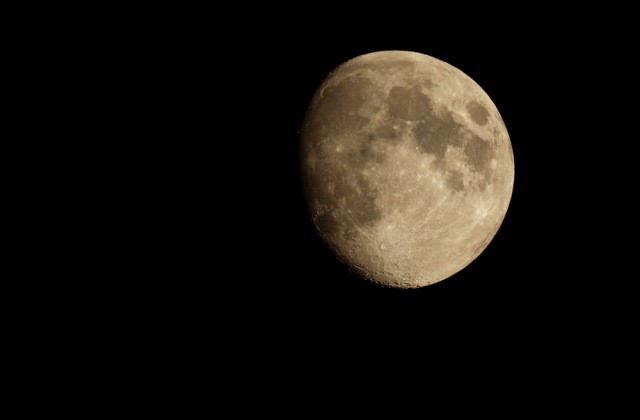
“[T]he changing force exerted by the Moon as it orbits — the same thing that drives the tides — creates subtle differences in the position of the hardware within the [Large Hadron Collider]. The differences are tiny for any individual piece of hardware, but they add up when it comes to something as big as the LHC, which has a circumference of nearly 27km. Plus, the LHC hardware is very, very sensitive to being out of alignment, given that it has to accurately direct bunches of protons that are moving at nearly the speed of light. The net result is that the LHC’s operators sporadically have to tweak the beam’s alignments…”
— All of the doubters and lunar apologists amongst us who have attempted to discredit my campaign against the moon… don’t you feel ashamed now that you know your precious piece of stupid space rock is trying to trigger the tiny black holes that will destroy the earth? You should! Never trust the moon. We can only hope that it is as incompetent as it is ugly and useless.
Photo by fotum, via Shutterstock
Four Hours in the Totebag Capital of the World
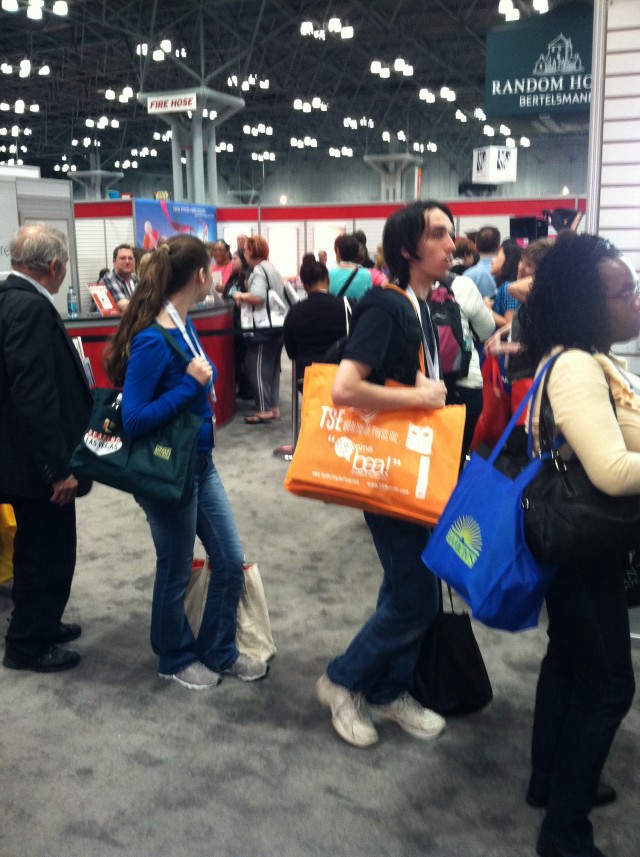
If you have anything to do with the book industry, you are probably nauseated by the mere mention of that industry’s annual tradeshow, which started on Monday and wraps up today. But not everyone is some sort of book fanatic — some people just read books and are innocent about the disgusting process that brings them into being, like little children who don’t know that babies are generated via fucking. I know this because in the comments on every blog post or news story about book publishing ever, there’s that person who asks “But if an author’s book doesn’t earn out its advance, does he have to give the money back?”
To those people, and to all the other people who have never set foot on the Javits Center’s weirdly overplush carpets, this post will be full of intriguing news and information (I hope). To authors and editors and publicists and sales reps and booksellers, it will be full of oversights and inaccuracies and stunning failures to comprehend the true nature of the situation. I’d like to begin by apologizing to those people and by making it clear that I don’t have a thesis about the future of publishing or a narrative arc or anything like that. If you are looking for either of those things — and I’m not just saying this because the author is my boyfriend (I hate the word “boyfriend” but what are you going to do, type “long-term makeout monkey” every time?) — please consult this genuinely definitive account of what goes on at BEA and what the book industry is all about. It has an amazing scene set at BEA’s incredibly consequential “Buzz Panel,” where editors give presentations about the books they hope will be that year’s unexpected breakout success by convincing the assembled booksellers and reps that it’s “just like Harry Potter crossed with Eat Pray Love, but in Afghanistan” or whatever. I didn’t attend the Buzz Panel, or any panels, and I skipped the “tech” area entirely because I couldn’t find it and my blood sugar was getting really low and a guy was grabbing my arm, offering me a free audiobook if I would please get in line for his author’s signing because his author, who I had never heard of, was a very famous blogger. Given that there was no one currently in the line to get a book signed by this author, it was hard to consider it a “line” per se, but BEA is the last place in the world you want to start quibbling about semantics — for one thing, it is covered with posters, as Rachel Fershleiser pointed out to me yesterday, that read “BEA: The Content and the Buzz.” (The Content and The Buzz, a novel by William Faulkner.) “I’ll be your best friend!” said the guy who was trying to recruit me for the line, a guy who I had never met and who definitely had no idea who I was except that my badge said “Reporter” on it. I will reveal that I declined his offer of best-friendship, but I’m getting a little ahead of myself here. First, let’s talk about the Javits Center.
The Javits Center is this very large convention center conveniently located at the intersection of 34th Street and the Hudson River. To get there you have to walk from the worst part of Manhattan to a part of Manhattan that is, improbably, even worse and also continually in the process of being demolished and rebuilt, and once you’re there you have to walk even a little bit further. I once temped at the Daily News, which is technically only three blocks away from the A at 34th Street, and one day I timed the walk to its office, which was then at 32nd and 11th Avenue. It took fifteen minutes, and I’m a fast walker. The walk to the Javits Center is twice as long and you might get hit in the face with a crane or fondled by a sexy construction worker, inspiring your next Harlequin romance, A Well Built Man. Proceed with caution, or not. At some point you see a billboard that celebrates Diary of a Wimpy Kid’s 5 years on the Times bestseller List. Congratulations: you have arrived, and it would be really time-consuming to turn back now.
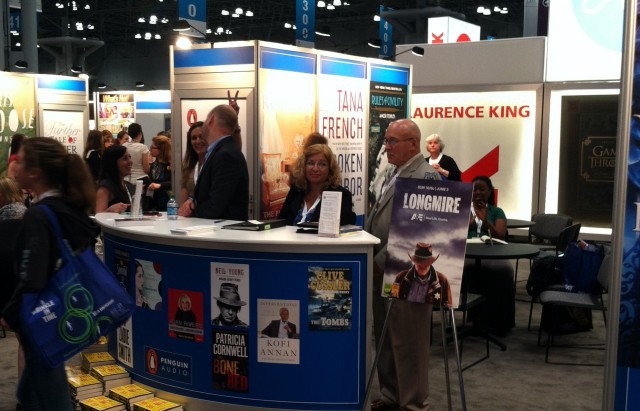
Inside, the Javits Center is like an airport with no scheduled departures and much more carpeting. It is hot and cold, somehow, at the same time, and it smells like the sad turkey wraps you’ll see hungry souls clutching as they crouch in the corners of the main convention floor eating hurriedly between meetings. There is not quite enough oxygen. It’s actually a lot less like being in an airport, actually, than it is like being on a plane. But like being on a plane that, if you have been in or around the book industry in some professional capacity, is filled with everyone you have ever met in a professional capacity. So it’s sort of like a high school reunion. On a plane. Ugh, fuck it, it’s like a giant trade show, okay? That’s what it’s like.
The main floor is filled with the booths and each publisher has a booth, and the booths vary in size depending on how big and important the publisher is/how big and important they want to seem to their competitors. The walls of the booths are decorated with poster-sized versions of the covers of whichever of this Fall’s upcoming books the publisher thinks it has a shot at selling the most of. There are usually a few chairs and maybe a podium or desk or raised dais for authors to sit on when they’re signing books, and there are usually galleys arranged in piles on the floor. If people are excited about a galley they will snatch it up immediately and there will be none left. I visited on day two and felt sad for the books that were still available, being restacked occasionally by hopeful publicists. If you walk by these areas too slowly sometimes someone will press a galley into your hands and try to tell you about it, so cultivating a horizon-stare and a quick gait is important. The latter is impossible sometimes because there are big herds milling through the aisles between booths at all times, and everyone is carrying at least one bulky totebag, and many of them are, er… visiting here from America. (You know?)
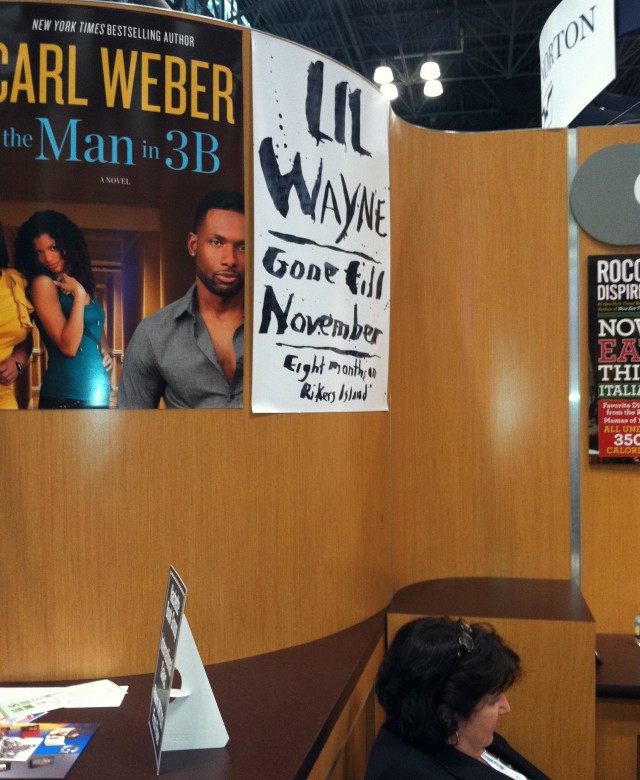
Looking at the relative amounts of real estate devoted to various publishers and the blown-up covers of the books they expect to be their cash cows is depresssing, if you let it be, if you’re a writer. If you’re an Author I don’t imagine that it’s depressing at all. I myself am a writer but even though I’ve written a book I don’t think I’d be considered an Author by the standards of commerical publishing. An Author is someone like Pippa Middleton, who is the Author of a new coffee-table book on “entertaining.” Do you get what I’m saying? An Author is someone people will line up for without being begged to, which typically means he is a celebrity, which means that he may have many talents (or, in the case of Pippa Middleton, a perfect butt) but is not typically a writer per se. Some people are Authors and Writers but this is exceedingly rare, and not really what BEA is all about.
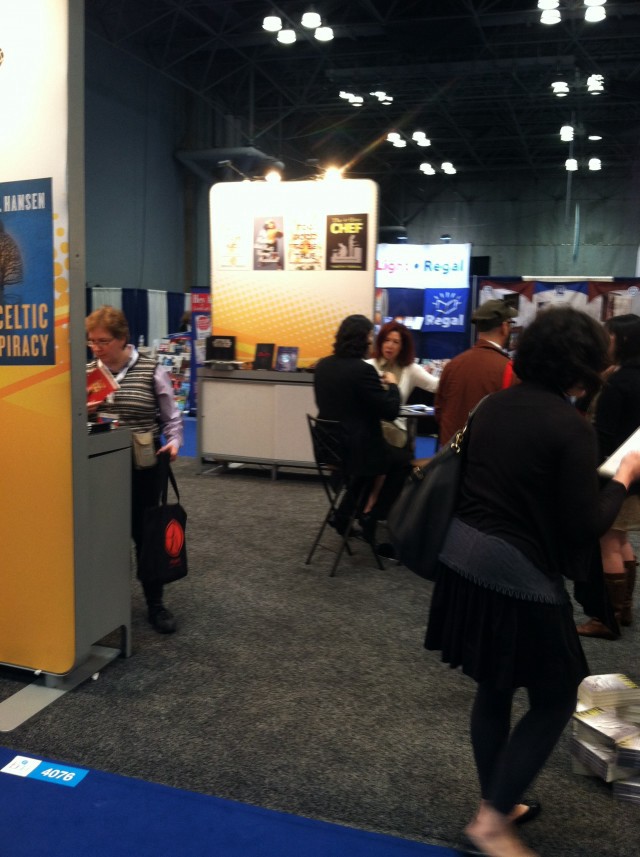
But if you look at it another way it’s not depressing. The cultural forces that loom so large in your mind turn out to be relatively small, boothwise.
Another thing that was un-depressing, to me, was to see the way people were avoiding the relatively large area that Amazon Publishing had rented out to showcase its still relatively small list of relatively lame-seeming book products. There weren’t loudspeakers blaring The Imperial March from Star Wars positioned just outside it, but… there kind of were. Invisibly, sub-audibly there were. “Dun dun dun, dundedun, dundedun.”
Ed Park, who is a very nice and talented writer and editor who used to work at The Believer before Amazon Publishing captured his soul and took him hostage, was sitting at its front table with the author of a mystery novel and no one was really seeming very interested in talking to either of them. The look on Ed Park’s face reminded me of how Sansa Stark looks when she has to profess her love for evil King Joffrey. Ed Park is totally the Sansa Stark of Amazon Publishing.
I might be completely projecting!
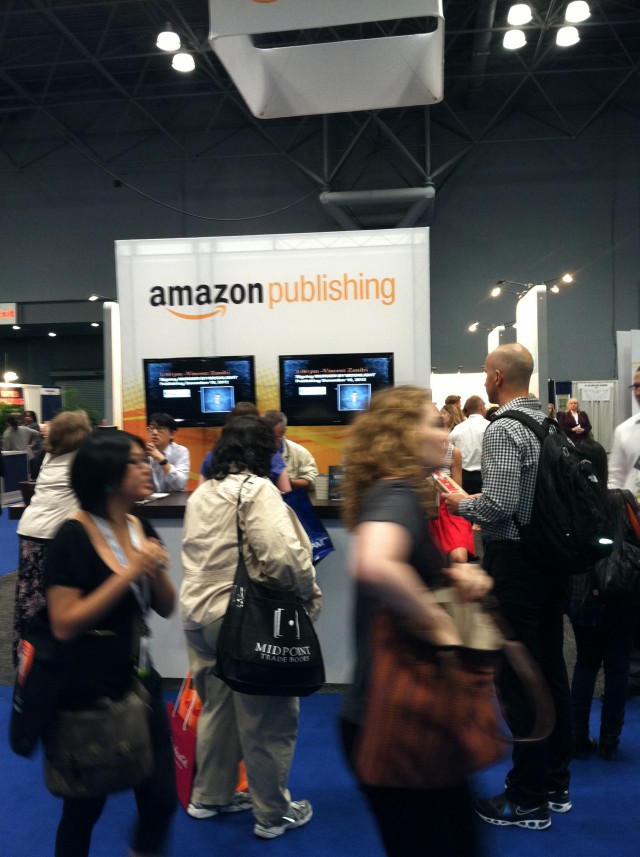
The rest of the big publishers’ booths were more hopping. Harlequin was the most hopping, signing-wise — ladies were lined up around and around it to get their books signed. I skated through Little Brown, got the best totebag in the room from Chronicle, skirted Workman, spent a blissful twenty minutes fondling everything NYRB Classics had to offer, and snagged catalogues from Soft Skull, Fantagraphics, Tin House, Seal Press, MP and other small presses that might be convinced to allow me to sell their books to my book club. This was sort of what I’d came to do, and once it was done I thought maybe I’d leave, but then I ran into Hillary Buckholtz, who runs the blog I’m Remembering. She was standing by a Tech Demo station. “Cover me while I take a terrible blurry photo of how sad the Tech Demo station is,” I told her, and she did.

Then the thing with the guy who tried to get us to stand in line in exchange for free audiobooks by a famous blogger happened. “There is a lot of desperation here,” Hillary said he walked away.
“Seriously,” I said, and then we both stood and watched as, to the right of the Tech Demo booth, a semi-well-preserved woman wearing her impressive cleavage like jewelry and holding a copy of her book (I think the title was Dumped) in one hand and a champagne flute in the other aggressively chatted with a potential reader.
“Speaking of, have you been to Blogworld yet?” she asked.
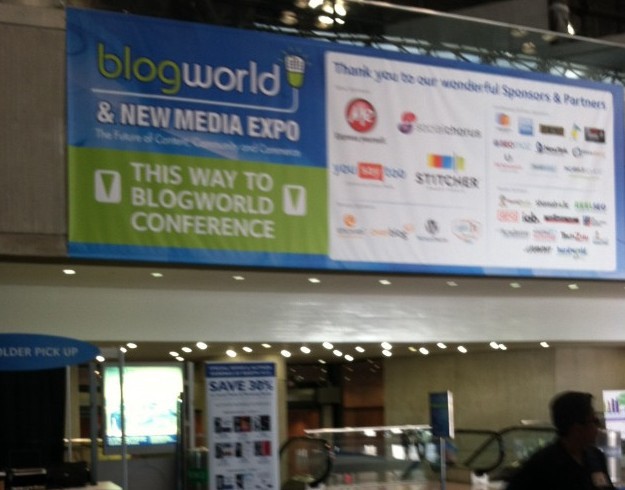
It turned out that Hillary had a special pass to something underneath BEA called Blogworld. We had to go down an escalator and no one checked to see if we had a special pass as we entered. Blogworld was not very populous. The main exhibitor, the company with the most booth real-estate, was WordPress, and then there were some other things that might be a huge deal, it doesn’t mean anything that I haven’t heard of them, probably.
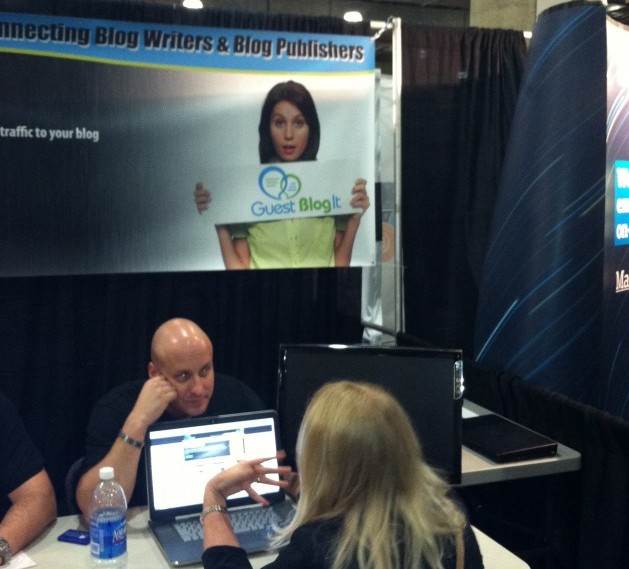
“There is going to be a lot of podcasting going on. Be careful not to get involved in a podcast,” she said. I was so struck by the ridiculousness of this statement that I wrote it down, but almost as soon as we entered Blogworld I understood what she meant, because a guy came over and tried to involve us in his podcast. “That guy over there’s girlfriend just broke up with him,” he said, pointing to someone in a plaid shirt tucked into khakis who was wearing headphones and podcasting, I guess, his little heart out. “Won’t you go over and talk to him and be on our comedy podcast?”
“We still have a lot of ground to cover,” Hillary said. “Maybe we’ll loop back around.”
This is a photo of the Hotmail booth at Blogworld.
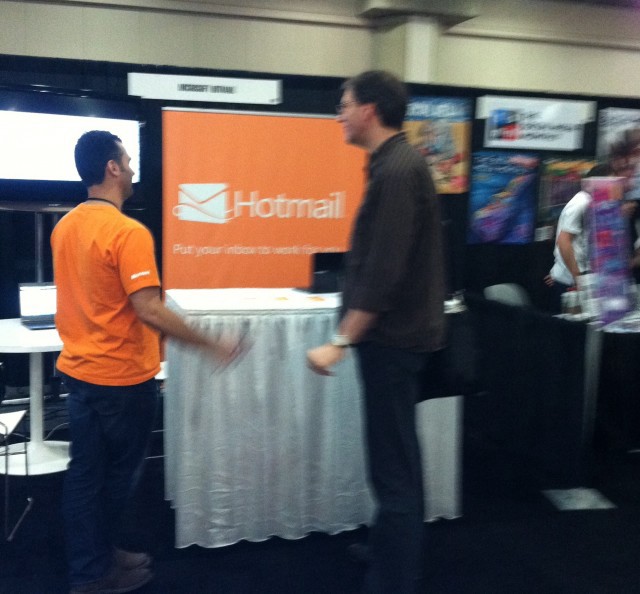
I took it as my cue to leave Blogworld and go back into the real world outside the Javits Center. I walked back towards the center of Manhattan feeling jetlagged. It had been like being on a plane, and a little bit like being at a high school reunion. But for people who work on behalf of books it is also a little bit, maybe, like a family reunion, complete with weird horrible relatives everyone quietly avoids and stupid traditions that stay alive because “that’s just the way we do things.” I ran into some of the people who are passionate, brilliant conservators of the proud tradition of actually editing books and making them better. I also saw Cee Lo Green flying completely under the radar in the lobby, even though he was wearing a white pinstriped suit. I hope he enjoys his time as an Author. It seems like a good gig.
Emily Gould is the co-proprietor of Emily Books and the host of the legendary Cooking the Books.
A Poem By Anne Marie Rooney
by Mark Bibbins, Editor
Sea change
In identical girls a group moves out
From The World to world in its other
Light. And clout. Closet we all come
To and open. Grow pinker to the splay
That mothers mine though uncolored. In
This, we are inked into. In some ways rightly
But betrayed. There is no word or entry
Or end to the engendering underwhelm
Or otherwise throated depth of them.
The girls of which I am bluntly one.
Nubby with my tucked-in two-fer moving
For to erase the redding sea but dumbly. Horn
Blow your answer. Wind return to center
My legs. How do I look. How
Do I look like the hook my body even
Newly free careens towards.
Anne Marie Rooney is the author of Spitshine (Carnegie Mellon University Press, 2012) and The Buff (The Cupboard, 2011). Born and raised in New York City, she currently lives in New Orleans, where she is a teaching artist.
I’ll let you in on a little secret: If you click the following link you will find yourself in the archives of The Poetry Section, which is where we keep all the poems. You may contact the editor at poems@theawl.com.
